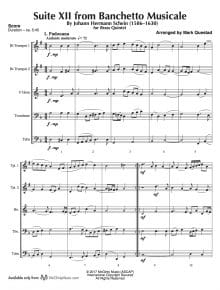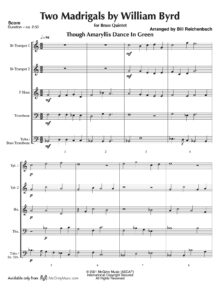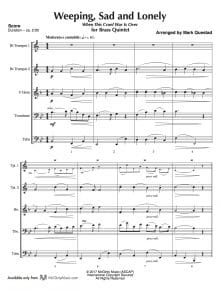Search Music
Music Categories
PDF Download Only
Purchase. Print. Play.
-
Suite XII from Banchetto Musicale – Brass Quintet
Johann Hermann Schein, a German composer of the early Baroque period, wrote his “Banquet Music” suites for unspecified instrumental combinations. This version offers phrasing and dynamics to compliment brass performance and modernizes (halves) the rhythmic values for easier reading.
The mp3 excerpt is performed by the Sine Nomine Brass Quintet. (Used with permission.)
Composer: Mark Questad
Instrumentation: 2 Bb Trumpets, F Horn, Trombone & Tuba
Duration/# of Pages: ca. 5:45 / 19 pages, 8.5″ x 11″
Key: N/A -
Two Madrigals by William Byrd – Brass Quintet
William Byrd, 1539/40 – 1623, was the leading English composer of his generation, and was a protegé of Thomas Tallis. In 1575 Queen Elizabeth I granted them a monopoly for printing, publishing and selling music and music paper.
He wrote extensively for every medium then available, except lute. Byrd is beast known for the development of the English madrigal.
This arrangement by Bill Reichenbach remains faithful to Byrd’s original music, and the brass quintet instrumentation adds color and dynamic shading to intensify the expressive qualities of the music. The two madrigals are Though Amaryllis Dance In Green and In Fields Abroad.
The excerpt includes the full versions of both pieces. It’s midi, using Note Performer, and will give you a preview of what your brass quintet may sound like.
Composer: Bill Reichenbach
Instrumentation: 2 Bb Trumpets, F Horn, Trombone, Bass Trombone/Tuba
Duration/# of Pages: ca. 2:50 / 14 pages, 8.5″ x 11″
Key: N/A -
Weeping, Sad and Lonely – Brass Quintet
Weeping, Sad and Lonely (also known as When This Cruel War Is Over) is a ballad that was popular during and after the American Civil War in both northern and southern states, a fitting selection for any Memorial Day celebration. In this treatment the plaintive melody is given an accompaniment reminiscent of the “American Brass Band Journal.”
The music was written by Henry Tucker, the lyrics by Charles Carroll Sawyer.
The lyrics are:
Dearest Love, do you remember, when we last did meet,
How you told me that you loved me, kneeling at my feet?
Oh! How proud you stood before me, in your suit of blue,
When you vow’d to me and country, ever to be true.CHORUS: Weeping, sad and lonely, hopes and fears how vain!
When this cruel war is over, praying that we meet again.When the summer breeze is sighing, mournfully along,
Or when autumn leaves are falling, sadly breathes the song.
Oft in dreams I see thee lying on the battle plain,
Lonely, wounded, even dying, calling but in vain.
CHORUS: Weeping, sad and lonely, hopes and fears how vain!
When this cruel war is over, praying that we meet again.If amid the din of battle, nobly you should fall,
Far away from those who love you, none to hear you call —
Who would whisper words of comfort, who would soothe your pain?
Ah! The many cruel fancies, ever in my brain.
CHORUS: Weeping, sad and lonely, hopes and fears how vain!
When this cruel war is over, praying that we meet again.But our Country called you, Darling, angels cheer your way;
While our nation’s sons are fighting, we can only pray.
Nobly strike for God and Liberty, let all nations see
How we loved the starry banner, emblem of the free.
CHORUS: Weeping, sad and lonely, hopes and fears how vain!
When this cruel war is over, praying that we meet again.The mp3 excerpt is performed by the Sine Nomine Brass Quintet. (Used with permission.)
Composer: Mark Questad
Instrumentation: 2 Bb Trumpets, F Horn, Trombone & Tuba
Duration/# of Pages: ca. 2:00 / 9 pages, 8.5″ x 11″
Key: Bb



